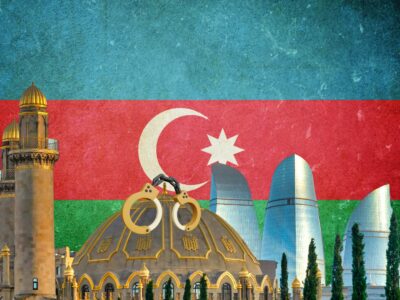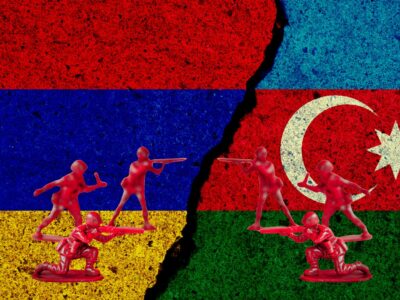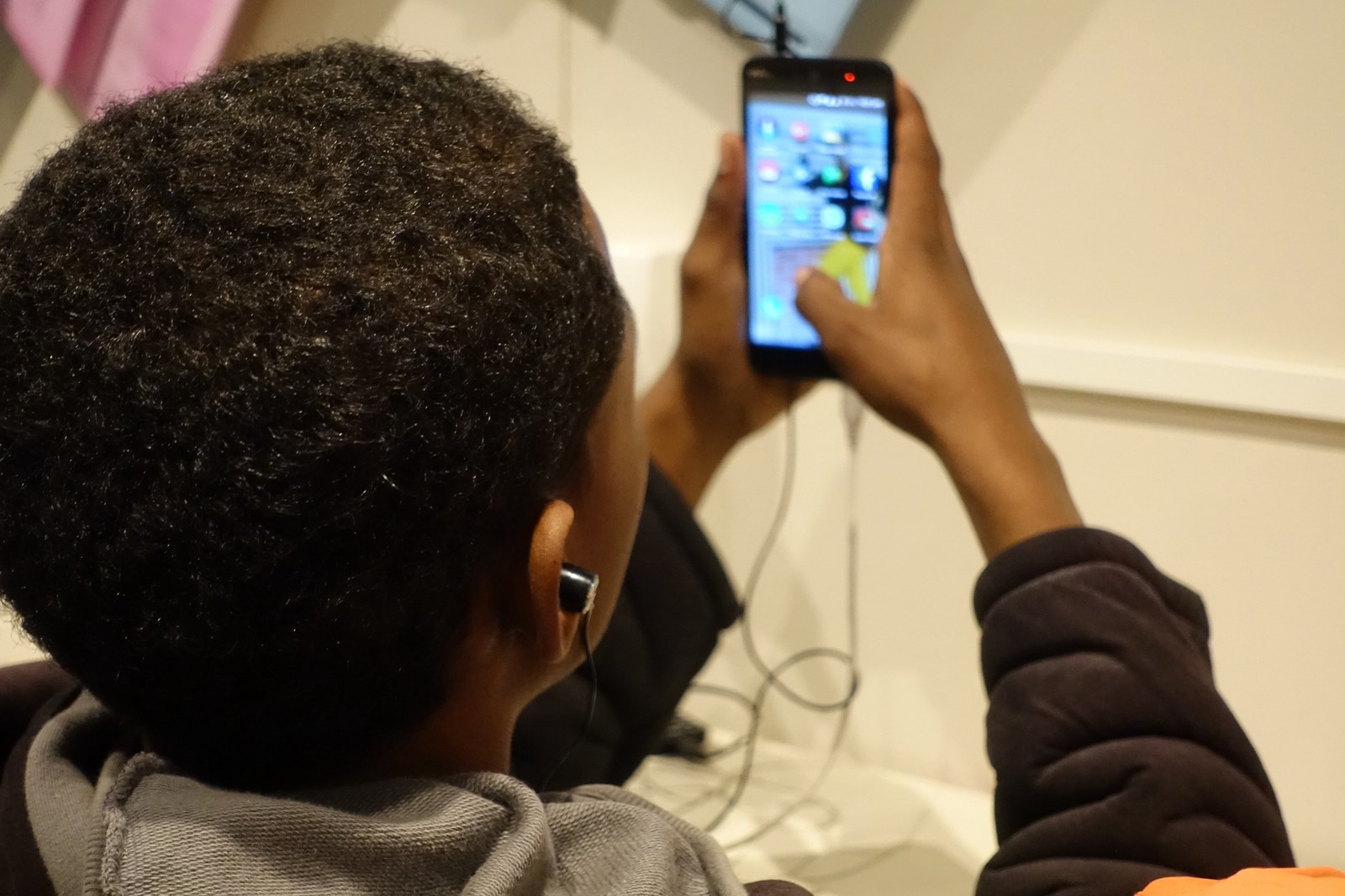
A young Eritrean boy accesses WhatsApp. Photo: Refugee InfoBus on Medium, reproduced with the permission of InfoBus Calais
Nine months after dismantling the “Jungle”, several hundred people who fled conflict, repression or economic insecurity in their countries for Europe continue to live in France's Calais in deplorable conditions, desperately awaiting their chance to be smuggled by truck into England via the tunnel that passes beneath the English Channel.
The challenges for these asylum seekers and migrants are many, including surveillance and periodic harassment by the ubiquitous police force, the outright absence of living space and hygiene, language barriers, and the lack of electricity and an Internet connection to communicate with family and friends and stay informed.
On that last one, an initiative called InfoBus is trying to help. It's a truck sporting a large antenna and covered with information posters and notices aimed at the asylum seekers and migrants of Calais.
We encountered the InfoBus when we returned to Calais one year after our first trip there to volunteer with the group Help Refugees. We were revisiting the organization's enormous warehouse, in particular, its “community kitchen”, which prepares some 2,500 meals each day before distributing them either at the sole authorized distribution site or by roaming the streets. We found that the organisations’ quality of work and volunteers’ resolution are as strong as ever, but the asylum seekers and migrants’ situation is definitely worse than it was last year.
The InfoBus spent the morning there recharging batteries that ran electronic equipment kept in the back. Its coordinator, Loan Torondel, gladly answered our questions.
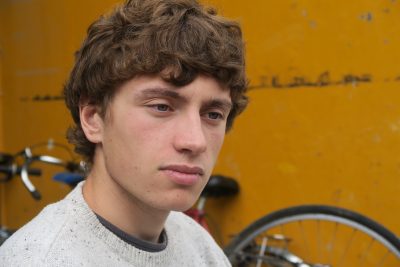
Loan Torondel. Photo Marie Bohner
Global Voices (GV): Can you tell us about the InfoBus?
Loan Torondel (LT) : Ce projet a été d'abord lancé par l’association Refugee Info Bus, déjà présente ici du temps de la Jungle, avec un véhicule qui venait apporter l’information et du WiFi, et après le démantèlement, ils sont allés en Grèce sur l’île de Chios. Le projet a été relancé tout récemment à Calais par l'Auberge des Migrants qui le gère à présent. Nous sommes trois à le faire fonctionner.
Loan Torondel (LT): The initiative was started by Refugee Info Bus, an organization that was already here in the Jungle. They had a vehicle that provided WiFi and information. After the Jungle was dismantled, they went to the Greek island of Chios. The project was recently started up again in Calais by its current sponsor, L'Auberge des Migrants. There are three of us who run it.
GV: What kind of training do you have?
LT : J’ai beaucoup appris sur le tas, mais j’ai suivi des formations sur les actions juridiques, la protection de l’enfance, les droits humains etc. Je vais reprendre des études plus poussées dans ce domaine.
LT: I've learned a lot on the job, but I've also had some training in legal matters, child protection, human rights, etc. I plan to pursue further studies in these fields.
GV: Do you work with local lawyers?
LT : Oui. Les réseaux associatifs de Calais ont récemment attaqué l'État en justice, sur les conditions de vie et le non-respect des droits des migrants ici. L'audience en appel est demain [28 juillet] [le Conseil d'Etat a confirmé le jugement de première instance donnant tort à l'État].
LT: Yes. The associative networks in Calais have recently sued the state over the living conditions and lack of respect for migrants’ rights. The appeal hearing is tomorrow [July 28] [The Council of State has since confirmed the Court of First Instance's judgement against the state].
GV: How does the InfoBus work?
LT : On va sur les différents lieux de distribution, pour apporter le WiFi, la recharge de portables, de l’info sur leurs droits et la procédure d'asile en France. D'où les affiches collées sur le van.
Pour la communication des associations nous collectons aussi de l’information, ce qu’on voit, ce que les réfugiés nous racontent sur ce qui se passe la nuit.
LT: We visit the various distribution sites, providing WiFi, recharging portable devices, giving out information about rights and how to seek asylum in France. That's what the posters on the truck are for.
We also collect information for organizations: what we see, what the refugees say goes on at night.
GV: Do you work with interpreters?
LT : On communique avec 2 ou 3 migrants qu’on connaît bien et qui ont un très bon anglais, ils nous servent d’interprètes. Pour les articles, on en trouve en pachtoune, en tigrigna et en amharique. On leur traduit aussi les articles de la presse française ou anglaise. Les informations très spécifiques aux droits sont dures à trouver sur Internet, on essaie donc de les leur fournir, de traduire, d’expliquer. Pour les questions juridiques personnelles, on les oriente vers des avocats.
LT: We communicate with two or three migrants that we know well and who speak very good English. They are our interpreters. We get articles in Pashtun, Tigrinya, and Amharic. We also translate English- and French-language articles for them. Specific legal information is difficult to find on the internet, so we try to provide it, translate it, and explain it to them. For personal legal matters, we refer them to lawyers.
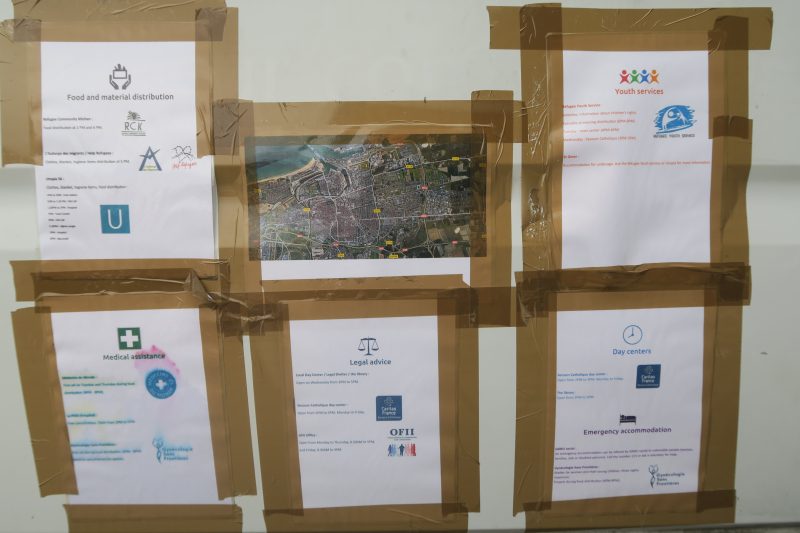
Notices posted on the InfoBus. Photo Marie Bohner
GV: Can you give us any stats?
LT : Une centaine de personnes viennent voir l'InfoBus à chaque passage. On peut connecter jusqu’à 70 personnes sur le réseau wifi. Ce sont plusieurs dizaines de gigas utilisés pour les migrants chaque mois.
LT: About 100 people come see the InfoBus along its route. We can provide WiFi for up to 70 people. The migrants use several dozen gigabytes each month.
GV: What have been the most surprising requests you've had on the InfoBus?
LT : Ils sont vraiment intéressés par ce que disent sur eux les gens, les médias… Ils ont beaucoup de mal à comprendre pourquoi il y a ici tant de violence envers les migrants, et c’est difficile de leur expliquer. Ils ont l’impression que tout le monde s’en fout ici, alors qu’il y a quand même beaucoup d’articles, les gens en parlent, se préoccupent d’eux.
LT: They're very interested in what people, the media, are saying about them. They don't understand why there has been so much violence against migrants here, and it's difficult to explain it to them. Despite the fact that there are so many articles and that people are worried and are talking about them, they think no one cares.
GV: Do many women come to the InfoBus?
LT : Il y en a quelques-unes ; 4 ou 5 hier. Mais il n'y a plus de structures spécifiques pour elles à Calais.
LT: There are a few, four or five yesterday. But, there are no longer any specific structures for them in Calais.
GV: Do you experience other difficulties in your work?
LT : Le bon côté, c'est qu'on a peu de problèmes avec la police. Ils s’en prennent aux distributions de vêtements et de nourriture, mais ne comprennent pas vraiment ce que fait l’InfoBus, donc ils nous laissent tranquilles.
On va sur les lieux de distribution, où il n'y a pas d’électricité, pas d’eau. C’est difficile de trouver des lieux avec une bonne couverture réseau, et un accès à l’électricité.
LT: On the upside, we have very few problems with the police. They are busy with distributing clothing and food and don't really understand what the InfoBus does. So, they leave us alone.
The distribution sites, however, don't have electricity or water. It's difficult to find good network coverage and access to electricity.
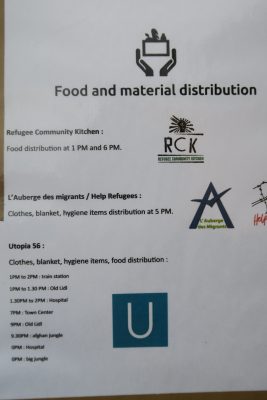
Notice posted on the InfoBus. Photo Marie Bohner
GV: What do you need?
LT : Il nous faut des fonds pour payer nos factures de FAI : la connexion de 70 personnes à la fois, tous les jours, ce sont beaucoup de données utilisées. On peut nous faire des dons sur le site de l’Auberge des Migrants.
On a besoin de dons de matériels technologiques, chargeurs, portables, cartes SIM…
Quand les mineurs n’ont plus d’argent et plus de moyen de communiquer, en termes de sécurité c’est grave, ils n’ont pas de moyen de prévenir les secours ou de nous appeler s’ils ont un problème. Ils sont dehors, ils dorment dans les bois, du coup les portables sont plus rapidement abîmés, de même quand ils essaient de monter sur les camions pour passer en Angleterre. On essaie donc de leur donner des portables en priorité.
LT: We need funds to pay our IAP bills. Connecting 70 people at a time, everyday, uses a lot of data. Donations can be made on the L'Auberge des Migrants website.
We need technological equipment: chargers, laptops, SIM cards,…
When minors no longer have any money or ways to communicate, their safety is at risk. They have no way to get help or call us if there is a problem. They're outside, sleeping in the woods. Their portable devices can be quickly damaged, especially when they try to climb onto trucks heading for England. So, we try to give cell phones to them first.
GV: Are you looking for volunteers with specific skills to work in the InfoBus?
LT : Toute personne ayant des compétences techniques assez poussées en informatique, en électronique, peut nous aider. Et aussi des personnes ayant des connaissances médicales, pour faire des premiers soins. Les migrants se blessent très facilement vu la dureté de leurs conditions de vie.
LT: Anyone with extensive technological skills with computers or electronics can help. We also have people with medical expertise providing first aid. The migrants get hurt easily living in such harsh conditions.
GV: To conclude, what message would you like to pass on to our readers?
LT : Beaucoup de gens n’ont pas conscience de ce qui se passe ici, puisqu'il n’y a plus de jungle, plus de bidonville, et c’est bien. Mais il y a toujours 700 personnes ! Les migrants sont partout et nulle part, dans les rues, dans les bois, ils n’ont pas de lieux de vie. Leurs conditions d’hygiène sont effroyables, des cas de « pieds de tranchées » ont été constatés, des ulcères nécrosés apparus pendant la 1ère guerre mondiale.
La meilleure manière de résumer la situation, c’est de dire « avant c’était pire, maintenant c’est encore pire ».
LT: Many people are unaware of what's happening here because there is no more jungle, no more shantytown, and that's good. But, there are still 700 people living here! There are migrants everywhere and nowhere, in the streets, in the woods. They don't have any living space. Hygiene is terrible. Cases of trench foot have been found, necrotic ulcers first seen during World War I.
The best way to describe the situation is to say, “Before it was bad, now it's even worse”.
Recent video reports about nighttime police operations and migrant survival conditions in Calais are available on the Taranis News website.
Because of France's new migration policy (for instance, asylum seekers coming from humanitarian disasters are welcome but not economic refugees) and strict regulations on food and clothing distributions, the future is still very much unclear for those remaining in Calais. Still, in the meantime, the InfoBus intends to be there to provide some support in ways of communication with their families.




